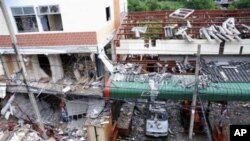An explosion on the outskirts of Bangkok that killed at least four people has added to Thailand's political uncertainty. It appears the country's political tensions are worsening.
Thai police say bomb makers may have accidentally set off the blast in an apartment building in a province neighboring Bangkok.
Police allege that supporters of the anti-government red shirt movement were behind the bomb making facilities.
Thousands of red shirts demonstrated for two months in central Bangkok this year, until the army broke up their camp in May. Ninety-one people died during the protests, in bombings and fighting, and more than 1,800 were injured.
Bangkok and three other provinces remain under an emergency decree imposed in April during the protests. The decree grants the government powers to curb the media and allows the detention of anti-government protesters without immediate trial.
Somphob Manarangsan, an economist at Chulalongkorn University, expects political tensions to rise.
"From now on the situation is going to be worsening and become increasingly chaotic. We can see several [political] vacuums in the Thai politics," said Somphob Manarangsan. "So that is why violence is going to be escalating, [in order] to shake the political stability led by the Democrat Party now."
Bangkok and other parts of the country have seen a series of bombings during the past few months, most of them doing little damage.
But authorities warn that political violence could escalate because of rallies that the red shirts and a rival group, known as the yellow shirts, plan to hold over the next week.
Most red shirts support former Prime Minister Thaksin Shinawatra, who was ousted in a military coup four years ago. They come largely from the country's rural residents and the urban poor.
The yellow shirts, generally middle- and upper-class urban residents, consider Mr. Thaksin to be corrupt and disrespectful to the country's revered king. Their protests helped provoke the coup, and yellow shirt protests in 2008 helped oust two elected pro-Thaksin governments.
Thitinan Pongsudhirak, a political scientist at Chulalongkorn University, expects new clashes between the red shirts and security forces despite efforts by the top military officer, General Prayuth Chan-ocha, to promote national reconciliation.
"The question now is what the red shirts will do. If they continue [to protest] we will see more clashes and confrontation," he said. "But if they somehow dissipate and fizzle out, if they buy into Prayuth's reconciliation plan, we may see some way forward. But I think the risk is on the confrontation side."
Since Mr. Thaksin was ousted in 2006, Thailand's political divisions have worsened and violence has occurred sporadically. In an effort to prevent violence, the army now patrols hundreds of locations in Bangkok.





